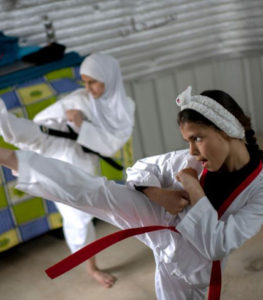Sport helping refugees cope with COVID crisis
Sports programs are helping refugees and displaced people cope with the COVID-19 crisis.
The Olympic Refuge Foundation (ORF) and UN refugee agency UNHCR have announced the launch of several new sports initiatives aimed at helping young people.
 Thomas Bach, the chair of the ORF and the President of the International Olympic Committee (IOC), and Filippo Grandi, UN High Commissioner for Refugees, said they are worried about the growing impact of the Covid-19 pandemic on the mental health of refugees and others uprooted by war, violence and persecution in a recent joint statement.
Thomas Bach, the chair of the ORF and the President of the International Olympic Committee (IOC), and Filippo Grandi, UN High Commissioner for Refugees, said they are worried about the growing impact of the Covid-19 pandemic on the mental health of refugees and others uprooted by war, violence and persecution in a recent joint statement.
The UNHCR said that refugees were among the most vulnerable to the consequences of the pandemic, because they often live in overcrowded camps, settlements and urban areas in cramped conditions with inadequate access to fresh water and hygiene supplies.
According to the UN agency, refugees and displaced people are also more vulnerable to mental health issues.
One in five people affected by conflict is struggling with mental health problems, the UNHCR said. The rate among the general population is significantly lower.
The ORF board has agreed to a number of initiatives to help displaced young people improve their mental health through sports.
Among these is a project they are launching in Uganda, using sport to improve the mental health of more than 10,000 refugees and locals aged 15 to 24.
“Around the world, we are seeing troubling evidence of the devastating impact of the pandemic on the mental health and well-being of young refugees,” UNHCR head Mr Grandi said.
“The Olympic Refuge Foundation has rightly identified the important contribution that sport can make to psychosocial wellbeing and is accelerating its work to address this growing challenge,” he said.
“Safe sport provides mental and physical wellbeing for all and, in particular, for people that have experienced and continue to experience trauma, loss and prolonged uncertainty,” ORF chair Mr Bach said.












